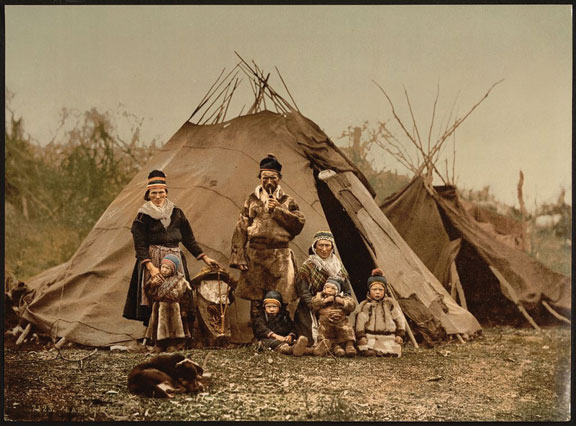
SEMINARIES, THEOLOGICAL colleges, and Bible schools used to prepare some students for “foreign missions” and others for “home missions.” Graduates who did not come out of one of those missionary departments were expected to preach among people where the faces — and the food and the humor — were familiar.
But today, the U.S. population of 314 million includes 39 million people born abroad, and Canada’s population of 35 million includes almost 7 million foreign-born residents. Regardless of where they work or minister, almost all seminary graduates will interact with people of diverse backgrounds — in the pews, at the local shelter, in the schoolhouse, or in the boardroom.
So preparing students to minister among diverse populations is an urgent need, not an add-on.
“Seminaries have to take the topic of intercultural competence seriously because of the cultural and demographic shifts that are upon us,” says Mark Harden, a former researcher at Bethel Seminary in St. Paul, who is now dean of the Boston campus of Gordon-Conwell Theological Seminary. And Harden says that intercultural competence can be taught, not merely caught.
“Intercultural competence training is a powerful strategy that many students find useful for understanding stereotyping, prejudice, and cultural bias,” he says. “It places everyone on a level playing field and leads to challenging conversations.”
Once dismissed as a diversion or as politically motivated, the teaching of intercultural competence has come into its own. “I think it’s essential to doing ministry in our diverse world,” says Steven Sandage, a former colleague of Harden’s at Bethel Seminary, who was recently named Danielsen Professor of Psychology and Theology at Boston University and director of research at the university’s Danielsen Institute. He defines the term this way: “Intercultural competence is the ability to perceive and understand cultural differences and then to relate effectively across those differences.”
Because misperceptions abound, Sandage offers these clarifications:
One day isn’t enough. A single day of “diversity training” can’t guarantee intercultural competence. “That’s the shotgun approach, and it’s often a waste of resources,” says Sandage. “People get discouraged with the one-size-fits-all concept. They sit through a generic training session but don’t know what they should be working on individually without an assessment and personalized feedback.”
A dog-eared passport doesn’t suffice. Extensive travel, studying abroad, or knowing languages isn’t the same thing as intercultural competence. Intercultural experiences can lead to growth or defensiveness, depending on how the traveler processes the experiences.
Cultures don’t melt. The old “melting pot” metaphor is little more than a popular myth. The idea that people surrender their uniqueness and assume the common perspective of any group they join is overly simplistic. “Cultural differences are powerful,” says Sandage, “and intercultural relationships necessitate a healthy awareness of differences.” Culture is more than ethnicity. Although intercultural competence typically involves ethnic differences, it also addresses other cultures: youth, the gay community, the urban poor, farm communities, and more. “It’s hard to find a ministry spot where dealing with differences would be irrelevant,” says Sandage. “Even in our seminary classes, we’re seeing a growing level of diversity.”
Skills don’t automatically transfer. A person who is competent in reaching one group may not be equally successful in reaching other groups. On the other hand, people with a high level of intercultural competence do tend to adapt more quickly to new groups and contexts.
The good news is that the research done by Sandage, Harden, and others has identified certain basic, underlying capacities that help people deal with a range of differences. “It’s not about knowing each and every culture; it’s about developing awareness, being humble and curious about others, asking the right questions, and looking at things from different perspectives,” says Sandage.
Once competence is achieved, the benefits go beyond a pastor’s ability to minister successfully to others. “Based on our data, I’m now willing to say that intercultural competence is one of the best measures of spiritual maturity that we can find.”
But first: a test
The Intercultural Development Inventory (IDI) is an assessment tool developed by Mitchell R. Hammer, a retired professor at American University in Washington, D.C. Sandage considers it the gold standard for measuring intercultural competence, and many corporations use it as they try to build their business around the world. Most researchers credit the business community with being ahead of religious organizations in identifying and adapting to cultural differences. While well-meaning ministers often focus on people’s similarities, trying to build unity, savvy business executives have turned in the other direction. They often tune into customers’ differences in order to achieve sales.
 “You’re not going to be effective at marketing unless you know the markets,” says Sandage. “You have to look at things from the customer’s point of view.”
“You’re not going to be effective at marketing unless you know the markets,” says Sandage. “You have to look at things from the customer’s point of view.”
Harden and Sandage were instrumental in bringing the IDI assessment process to Bethel Seminary, where it has been widely used by students and faculty. Completing the 50-item test, along with follow- up activities, is part of coursework and other training opportunities.
The research team finds that some people are eager to learn how they score but get defensive when they hear their results. In fact, most participants perceive themselves to be more culturally competent than they really are. More than 70 percent usually fall short of competence the first time they take the IDI.
Progress is possible but doesn’t happen spontaneously, says Sandage. Most people find it helpful to receive specific feedback on their intercultural strengths and next steps for development.
After participants at Bethel take the IDI, they typically schedule private feedback sessions to discuss their scores and design individual plans for growth. The campus has made intercultural competency a key learning outcome throughout the curriculum, so the concepts are woven into academic classes and offcampus experiences.
Many faculty members serve as role models by taking part in the assessment and encouraging students to follow their lead. Growth strategies typically include exposure to situations involving persons of diverse backgrounds. “You can’t just read a book about it; you have to venture outside your comfort zone,” says Sandage. “There definitely needs to be an experiential component. But our research shows growth in intercultural competence can happen with a multipronged approach.”
Graduates who achieve intercultural competency find many opportunities to apply their skills in their ministries. Some have taken an additional step and become IDI-certified, which enables them to administer the evaluation instrument and help others improve their levels of competency. “The IDI assessment and feedback process gave me a snapshot of the intercultural work I had done and what was still ahead of me,” says Michelle Beilby, a Bethel Seminary graduate who is now an IDI consultant. “The ability to embrace a deeper curiosity toward intercultural differences and similarities has equipped me to work with lay leaders and ministry professionals who are in increasingly complex and diverse settings.”
Such settings vary and may involve individuals or entire groups—perhaps a congregation, a mission team, or a church-planting task force. For example, members of a congregation might decide to reach out to the growing number of immigrants in their community. Before they create programs and plan special events, they participate in an assessment that produces a group profile indicating their readiness to welcome newcomers. Members then attend training sessions to prepare them for the outreach effort. Sandage, Harden, and Beilby are among a growing number of intercultural consultants who work with churches, universities, businesses, mental health clinics, and other organizations seeking to grow in intercultural competence.
“The worst thing that can happen is for persons from a different culture to come to a church for awhile, find the environment doesn’t feel hospitable, and leave,” says Sandage. “That’s discouraging for the visitors and the hosts alike—because both groups feel they tried something new and failed. We are increasingly seeing well-intentioned ministry leaders suffer a short shelf life because they lack the competence to pull off a new intercultural mission or ministry.”
The cost of competence
Many seminaries offer diversity training to students, but the concept of an assessment tool, coupled with individual feedback, is relatively new. Cost can be a concern, since the IDI requires that a certified consultant administer the test. At Bethel, outside consultants were hired for the early rounds of assessments, but “once we realized that we liked the process and wanted to do more of it, the school paid for several persons to be certified so they could work directly with the students,” explains Sandage.
The advantage of using outside expertise rather than in-house personnel is particularly valuable with faculty and staff training: “It’s often sensitive for a faculty member or administrator to know the scores of their colleagues,” says Sandage.
Adjustments to the curriculum are a natural outgrowth of the assessment, but no major overhaul is usually required. As professors become sensitized to the issue through their own assessments, they find ways to bring intercultural topics and perspectives into classroom discussions. And after two or three years of ongoing exposure to the training, students usually find their levels of competency have increased. “When we do repeat testing, many see they’ve made progress,” says Sandage. “That’s very encouraging for students, faculty, and staff.”
An interesting—and unanticipated—discovery of the research at Bethel, which has been funded by the Fetzer Institute, is the solid connection between intercultural competency and spirituality. “We find that intercultural competency is positively correlated with various aspects of spiritual formation and spiritual maturity,” says Sandage.
What’s the connection? Sandage says that persons who achieve competency are humble about their own perspectives, they exhibit empathy and gratitude for others, they aren’t judgmental or resentful, and they don’t assume their traditions or practices are superior to everyone else’s. They tend to experience a warm, secure connection with God and feel purposeful about exploring the world and offering service to others. This outlook is consistent with high levels of spiritual and emotional well-being.
By contrast, “persons who are not growing in intercultural competence are likely to suffer anxiety about their inability to deal with diversity,” says Sandage. “As our world becomes more and more diverse, they will feel more and more uncomfortable and threatened. That can take a spiritual toll on people as they hunker down and become self-protective.”
The Bethel research has also revealed that some traditional markers of spirituality in the evangelical context, such as petitionary prayer and evangelistic involvement, are not associated with spiritual wellbeing among students, while intercultural competence is related to higher spiritual well-being. This kind of assessment-based research allows an educational community to test its assumptions, and it invites leaders to embrace accountability for actual outcomes in the spiritual formation of students.
The favorable impact that competency training has on ministry spills over to other settings, both professional and personal. The characteristics of empathy, humility, and the willingness to view situations from different perspectives go a long way toward resolving differences in any relationship, Sandage says. He recalls leading a series of training sessions for a group of highlevel corporate executives: “After a few months, one of the business leaders came up to me and said, ‘I don’t know if I’m gaining intercultural competence, but my marriage is going a lot better!’”
Holly G. Miller is senior editor of the Saturday Evening Post, author of 14 books, and a member of the In Trust Writer Workshop.
Historic travel images are from the Photocrom Print Collection of the Library of Congress.